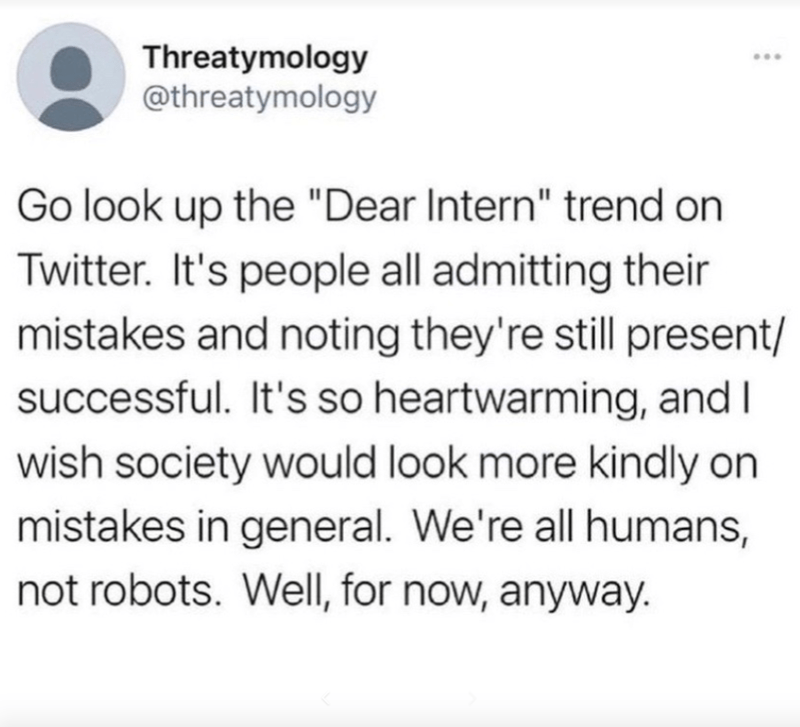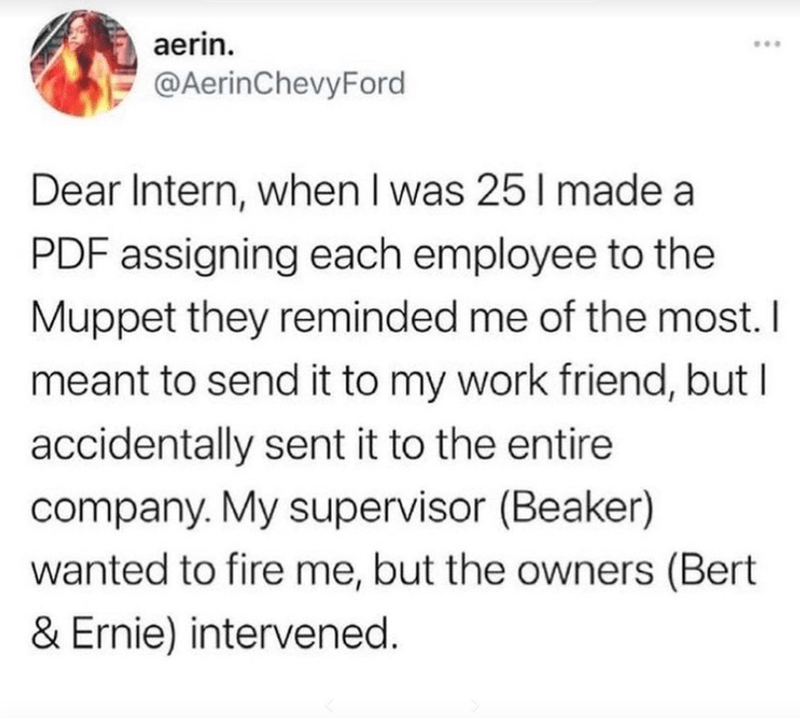Oof. That picture you meant to send to your doctor ended up in a reply-all email that went directly to the boss’ inbox? ? Yikes.
We’ve all been there–making blunders that sent us to camp out under your desk to hide for the rest of the week so you don’t die from embarrassment, or worse, to avoid a tongue-lashing or a memo that sends you packing.
There’s good news: times are changing, even in the professional world. Although an easy out is to “cancel” the error maker, firing someone over a mistake (even a costly one) is a rigid and reactionary archaic default that rarely serves us, or our companies, well.
Companies and their associates may be institutions, but the innards are made of humans. Because of that, the social and cultural revolution on the horizon is fast approaching, and that affects all of us–and our businesses–whether we acknowledge it or not. And it’s proving to have better outcomes when we welcome that humanity instead of cutting out the parts that make up the best part of our species.
Now let’s capitalize on that like HBO, who gained a lot of respect when an intern made an error for the whole world to see in 2021. But the impact wasn’t what you might think.
“Creating an environment where there is fear, anxiety and lack of trust makes people shut down. If people have fear and anxiety, we know from neuroscience that their threat response is engaged, their cognitive control is impacted. As a consequence, their productivity and creativity diminish.”
– Dr. James Doty, Neurosurgeon
In this article:
- What Happened
- The Fallout
- Our Fave Commiseration Shares
- What if There Was More of This?
- Feeling Negatively & Chomping at the Bit for a Quick Fix is Normal
- A Better Way
- Compassion is a Viable Solution for Admired Leaders
- Where to Start: A 4-Step Guide to a Compassionate Workplace
- Let’s Put a Bow on This
- Further Reading
What Happened
The short of it: in 2021, an HBO Max (since the streaming service rebranding last month is now just “MAX”) intern sent out an email titled, “Integration Test Email #1” to the entertainment company’s massive subscriber list. Yeah, that wasn’t meant to happen.
HBO apologized most famously on Twitter, acknowledging the error, who made it, and that they were sorry for any inconvenience and supported the intern who had hit “send” that fateful day.
We mistakenly sent out an empty test email to a portion of our HBO Max mailing list this evening. We apologize for the inconvenience, and as the jokes pile in, yes, it was the intern. No, really. And we’re helping them through it. ❤️
— MaxHelp (@maxhelp) June 18, 2021
But the company wasn’t the only support that the entry-level employee received; the internet had their back, too. Thus, the #DearIntern trend was born.
BACK TO TOP
The Fallout
Although it happened 2 years ago, this last week the hashtag #DearIntern has resurfaced again. Because of their compassionate response that also showed off their sense of humor, HBO is once again being lauded on social media by many supporters due to the way they handled the public mistake, both in their PR response and navigating the intern’s experience.
Although there are a lot of streaming services available out there to choose from, they stand out of the din like a light on a hill. From December 2021 (when the email went out) to the second quarter of 2022, HBO Max saw a HUGE jump in subscribers.

Now, I’m not saying that #DearIntern is the only reason for their success. But it definitely didn’t hurt.
Our Fave Commiseration Shares
We saw this:
And so we did. And what a treasure trove, it was so hard to pick just a couple handfuls!

BACK TO TOP
What if There Was More of This?
In today’s fast-paced and competitive professional world, public mistakes can be inevitable. However, the traditional response of blame, criticism, and punishment often perpetuates a negative work culture and hinders growth and innovation.
Exploring the transformative potential of kindness and compassion in professional settings when public mistakes occur can actually be beneficial, both monetarily and holistically. By embracing these values, individuals and organizations can foster a supportive environment that encourages learning, personal and professional development, and mental well-being which in turn leads to improved collaboration and communication, unburdened innovation, meaningful customer connection and brand loyalty, and a hand-crafted modus operandi in the future of industry.
Feeling Negatively & Chomping at the Bit for a Quick Fix is Normal
Luckily for our dear intern at MAX, the damage was mild at most. In fact, it helped endear the company to many, and continues to do this day. Yet not all snafus are so easily forgivable.
First things first: it’s normal to freak out or panic when something big goes awry. Frustration is of course the natural response, and one we all can identify with. This is especially true if the mistake hurts an important project or reflects badly upon us.
The traditional approach is to reprimand the employee in some way. The hope is that some form of punishment will be beneficial: it will teach the employee a lesson. Expressing our frustration also may relieve us of the stress and anger caused by the mistake. Finally, it may help the rest of the team stay on their toes to avoid making future errors.
A Better Way
Some managers, however, choose a different response when confronted by an underperforming employee: compassion and curiosity. Not that a part of them isn’t frustrated or exasperated — maybe they still worry about how their employee’s mistakes will reflect back on them — but they are somehow able to suspend judgment and may even be able to use the moment to do a bit of coaching.
What does research say is best? The more compassionate response will get you more powerful results.
Compassion is a Viable Solution for Admired Leaders
Compassion and curiosity increase employee loyalty and trust. Research has shown that feelings of warmth and positive relationships at work have a greater say over employee loyalty than the size of their paycheck.
That’s saying something, because as we know, money and financial stability are important. New York University’s Jonathan Haidt’s study shows that the more employees look up to their leaders and feel elevated by their compassion or kindness, the more loyal they become to them.
The more compassionate you are to your employees, the fact that they will be more loyal to you isn’t the only win. It’s been observed that others outside of the interaction or experience who have witnessed this behavior may also experience being vicariously uplifted, feeling more devoted to you.
This is because compassion…
…enhances work culture.
Compassionate leadership promotes psychological safety as employees feel comfortable taking risks and expressing their ideas, encourages collaboration and teamwork with an environment where mistakes are opportunities for collective growth, and boosts morale and job satisfaction as motivation and loyalty is increased among employees.
…sets the tone for other companies, industries, and society. (AKA social impact)
Kindness and compassion extend beyond the workplace and have a positive social impact. Industries that prioritize these values contribute to the well-being of employees, customers, and the communities they serve. By promoting a culture of empathy and care, industries can play a significant role in creating a more compassionate and inclusive society. How exciting is that?!
…attracts the right customers (and future employees).
Companies known for their compassionate approach attract customers who value ethical business practices. Genuine care for employee well-being and customers’ needs leads to increased customer loyalty and positive sentiments all around. (Great for GlassDoor & Yelp Reviews!)
…brings in more revenue.
The benefits of kindness in professional settings extend beyond the intangible aspects of a positive work culture and employee well-being. Adopting these values can raise a company’s bottom line in the following ways:
- Increased Productivity
- When employees feel psychologically safe and supported, they are more likely to take risks, think creatively, and contribute their best efforts, ultimately leading to higher output and efficiency.
- Improved Employee Engagement and Retention
- When workers feel valued and appreciated, they are more engaged in their work, resulting in higher job satisfaction and reduced turnover rates. This, in turn, saves the company resources associated with recruitment, onboarding, and training new employees.
- Enhanced Collaboration and Teamwork
- In a compassionate work culture, employees are more inclined to communicate openly, share ideas, and support one another. This synergy leads to better problem-solving, increased efficiency, and improved decision-making that upgrades the company’s overall performance.
- Positive Brand Image and Customer Satisfaction
- Customers appreciate and gravitate towards organizations that prioritize ethical practices and genuine care. This positive brand image contributes to customer satisfaction, repeat business, and positive word-of-mouth referrals, thereby boosting sales.
- Reduced Costs of Stress and Burnout
- Prioritizing reduction of stress and burnout levels, companies can mitigate the associated costs such as decreased productivity, absenteeism, and healthcare expenses that can be pinpointed on employee states of mental health. Healthy and engaged employees are known to more frequently perform at their best, leading to cost savings.
- Talent Attraction and Retention
- In today’s competitive job market, attracting and retaining top talent is crucial for a company’s success. Potential candidates are drawn to workplaces that prioritize employee well-being, growth, and a positive work environment. This gives the company a competitive edge in attracting and retaining high-performing individuals who contribute to the company’s success.
BACK TO TOP
Where to Start: A 4-Step Guide to a Compassionate Workplace
Number one: It’s GOT to start at the top. Executives no longer have the luxury of being stand-offish and bringing down the hammer blindly, never looking into the faces of those whose lives they affect.
Next, commit to begin not with others, but yourself. Then, follow the guidelines below:
1. Foster Self-Compassion – it’s important.
- Encourage self-reflection: Acknowledge mistakes without self-judgment.
- Cultivate self-acceptance: Reiterate that mistakes are part of the learning process and not a reflection of personal worth.
- Practice self-care: Prioritize mental and physical well-being. No, this is not just for health nuts.
2. Embrace a Growth vs. Fixed Mindset – in as many aspects as possible. (Yes, you CAN have both simultaneously!)
- Shift focus from failure to learning: Frame mistakes as valuable opportunities for growth and improvement.
- Never stop learning or developing yourself and others: Seek and provide resources, training, and support to enhance skills.
- Practice constructive feedback: Encourage regular feedback discussions that focus on improvement rather than blame.
“I never lose. I either win or I learn.”
– Nelson Mandela
3. Encourage Empathy and Understanding – and level up your leadership.
- Develop active listening skills: Find ways to listen attentively and seek to understand others’ perspectives. Listen to hear and comprehend, not to respond.
- Take part in perspective-taking exercises: There are many resources to find that can outline how to gain empathy and broaden understanding.
- Provide diversity and belonging training: A culture of respect and appreciation for different backgrounds and experiences opens you up to an exciting, wonderful, vivacious world.
4. Lead by Example – or face dire repercussions.
- Display vulnerability: Leaders who openly acknowledge their own mistakes and demonstrate resilience don’t come across as weak as some think. Rather, it takes strength and courage.
- Communicate compassionately: Constructive and empathetic language when addressing mistakes or providing feedback can mean the difference between top and bottom return performance.
- Recognize and appreciate efforts: Celebrate individual and team achievements, emphasizing progress and growth.
BACK TO TOP
Let’s Put a Bow on This
So the next time one of your employees causes a PR hiccup or even a costly error, remember that being professional shouldn’t mean being perfect; rather, that being professional means owning your snafus, trying compassion on for size when it thankfully isn’t you on the hot seat, or even standing up to a the board when they call for heads to roll in a knee-jerk reaction.
Firing or harshly punishing an employee for a mistake or PR blunder, even a grave one, can lead to missed learning opportunities, toxic work environments, negative impacts on morale, damage to employer brand and reputation, potential legal and ethical issues, and loss of organizational knowledge (not to mention the costs of recruiting, hiring, and training a replacement).
Emotions are strong. Their purpose is to inform us that we must act. But an essential step to evolving is to halt reactionary response to take a beat so we can respond thoughtfully, with wisdom as the driver instead of hormones. By prioritizing kindness and compassion, companies can create a win-win situation where both the employees and the company thrive.
Because we now know: we rise together, or we fall apart. Grow or stagnate is our choice. For us at Fullmoon, we choose the former.
What’ll it be for you?
Further Reading
- Compassion in Business: Why it Matters and How to Practice it
- Why Compassion Is a Better Managerial Tactic than Toughness
- 8 Steps To Take After Making Mistakes at Work (With Tips) | Indeed.com
- 10 Ways Leaders Fix Mistakes Without Making It Worse | Entrepreneur
- How Compassion Can Make You More Successful – Knowledge at Wharton
BACK TO TOP






